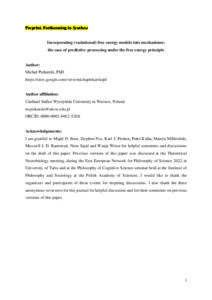Piekarski, Michał
(2023)
Incorporating (variational) free energy models into mechanisms:
the case of predictive processing under the free energy principle.
[Preprint]
![[img]](https://philsci-archive.pitt.edu/22350/1.hassmallThumbnailVersion/Incorporating%20%28variational%29%20free%20energy%20models%20into%20mechanisms%20%28Preprint.%20Forthcoming%20in%20Synthese%29.pdf)  Preview |
|
Text
Incorporating (variational) free energy models into mechanisms (Preprint. Forthcoming in Synthese).pdf
Download (465kB)
| Preview
|
Abstract
The issue of the relationship between predictive processing (PP) and the free energy principle (FEP) remains a subject of debate and controversy within the research community. Many researchers have expressed doubts regarding the actual integration of PP with the FEP, questioning whether the FEP can truly contribute significantly to the mechanistic understanding of PP or even undermine such integration altogether. In this paper, I present an alternative perspective. I argue that, from the viewpoint of the constraint-based mechanisms approach, the FEP imposes an important constraint, namely variational free energy, on the mechanistic architecture proposed by PP. According to the constraint-based mechanisms approach, high-level cognitive mechanisms are integral parts of extensive heterarchical networks that govern the physiology and behavior of agents. Consequently, mechanistic explanations of cognitive phenomena should incorporate constraints and flows of free energy as relevant components, given that the implemented constraints operate as long as free energy is available. Within this framework, I contend that the FEP provides a relevant constraint for explaining at least some biological cognitive mechanisms described in terms of Bayesian generative models that minimize prediction errors.
Monthly Views for the past 3 years
Monthly Downloads for the past 3 years
Plum Analytics
Actions (login required)
 |
View Item |



